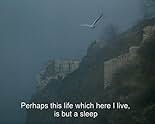Añade un argumento en tu idiomaA poet find inspiration in nature and solitude.A poet find inspiration in nature and solitude.A poet find inspiration in nature and solitude.
Imágenes
Argumento
Reseña destacada
This movie is the very last opus of a great Czech director Frantisek Vlácil(1924-1999; Markéta Lazarová, Valley of the Bees, Concert at the End of Summer) and it's truly his masterpiece.
In a breathtaking way it narrates some episodes from the life of possibly the most famous Czech poet Karel Hynek Mácha (1810-1836). Actually the title of the film "Mág" may have two meanings, the first one (a mage) refers to the talent of the deeply romantic Mácha (played by outstanding Jirí Schwarz), the second one is the contemporary transcription of Mácha's most famous poem Máj (May).
Throughout the film, we witness a deep analysis of Mácha's complex character (his relation to another Czech writer of the time Josef Kajetán Tyl, his unbearable jealousy, his solitude, his attitude to nature,etc.) on the well-depicted historical background with all its particularities (the misunderstanding of his poetry, the national revival or the most funny scene which illustrates how Mácha might have gotten the censorious permit).
However, what I liked the most about the film are the scenes with Mácha surrounded by stunning landscapes when the time stops and the plot is interrupted by Rudolf Hrusínský reading the most lovable parts of Máj.
In a breathtaking way it narrates some episodes from the life of possibly the most famous Czech poet Karel Hynek Mácha (1810-1836). Actually the title of the film "Mág" may have two meanings, the first one (a mage) refers to the talent of the deeply romantic Mácha (played by outstanding Jirí Schwarz), the second one is the contemporary transcription of Mácha's most famous poem Máj (May).
Throughout the film, we witness a deep analysis of Mácha's complex character (his relation to another Czech writer of the time Josef Kajetán Tyl, his unbearable jealousy, his solitude, his attitude to nature,etc.) on the well-depicted historical background with all its particularities (the misunderstanding of his poetry, the national revival or the most funny scene which illustrates how Mácha might have gotten the censorious permit).
However, what I liked the most about the film are the scenes with Mácha surrounded by stunning landscapes when the time stops and the plot is interrupted by Rudolf Hrusínský reading the most lovable parts of Máj.
- rathunter
- 9 sept 2004
- Enlace permanente
Selecciones populares
Inicia sesión para calificar y añadir a tu lista para recibir recomendaciones personalizadas
Detalles
Contribuir a esta página
Sugerir un cambio o añadir el contenido que falta

Principal laguna de datos
By what name was Mág (1988) officially released in Canada in English?
Responde

















